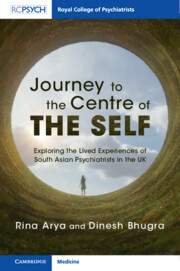 Journey to the Centre of the Self
Journey to the Centre of the Self Book contents
- Journey to the Centre of the Self
- Reviews
- Journey to the Centre of the Self
- Copyright page
- Contents
- Acknowledgements
- Glossary
- Part I Contextual Information
- Introduction
- Chapter 1 Culture and Psychiatry
- Chapter 2 An Overview of South Asian Migration to the UK
- Chapter 3 An Overview of the Interviews
- Chapter 4 Capturing the Lived Experience
- Chapter 5 The Primacy of the Lived Experience as the Route to Change
- Part II The Interviews
- Part III Analysis
- References
- Index
Chapter 4 - Capturing the Lived Experience
from Part I - Contextual Information
Published online by Cambridge University Press: 04 October 2024
- Journey to the Centre of the Self
- Reviews
- Journey to the Centre of the Self
- Copyright page
- Contents
- Acknowledgements
- Glossary
- Part I Contextual Information
- Introduction
- Chapter 1 Culture and Psychiatry
- Chapter 2 An Overview of South Asian Migration to the UK
- Chapter 3 An Overview of the Interviews
- Chapter 4 Capturing the Lived Experience
- Chapter 5 The Primacy of the Lived Experience as the Route to Change
- Part II The Interviews
- Part III Analysis
- References
- Index
Summary
The interview questions were designed to enable the psychiatrists to reflect on their lived experiences, that is their personal knowledge about the world gained through direct, first-hand experience. This standard definition emphasises the subjective knowledge that individuals form through direct encounters, interactions and observations. The authors were particularly interested in learning about how the negotiation between South Asian and British cultures played out in the course of their working lives at the level of the lived experience rather than abstractly. Frantz Fanon’s existential-phenomenology is used as an example of an approach known as ‘critical phenomenology’ understood as a form of politically engaged practice capable of reflecting the concrete conditions of existence. Fanon’s significance within this context is heightened, given his credentials as a psychiatrist and his method of the lived experience as the route to learning about difference. Living through the era of French colonialism, he examined the devastating impact of colonialism and its concomitant effects on the self, on himself, as the colonised but also as the psychiatrist, and had a greater understanding of and empathy with his patients because of their shared experiences. Through powerful phenomenological description, he described his own feelings of being othered and displaced, and how this precarious sense of selfhood had lasting effects on his sense of identity.
- Type
- Chapter
- Information
- Journey to the Centre of the SelfExploring the Lived Experiences of South Asian Psychiatrists in the UK, pp. 31 - 37Publisher: Cambridge University PressPrint publication year: 2024
